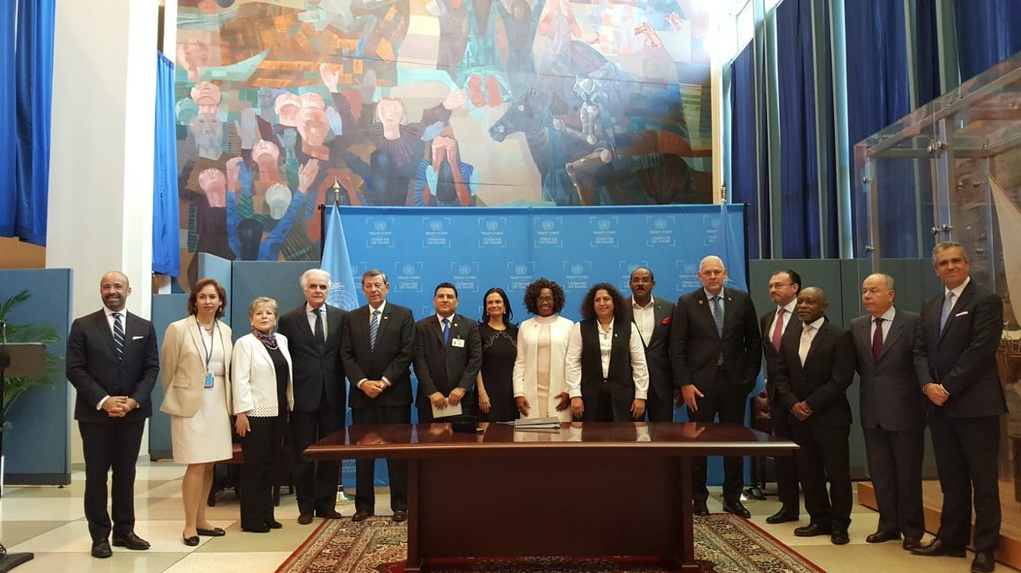2021 is proving to be a year full of challenges for Latin America and the Caribbean, but it began with good news: the ratification of the Escazú Agreement. This is the first major environmental pact in the region and opens a new phase, as it seeks to guarantee the rights of all people to a healthy environment and sustainable development. It also seeks to facilitate access to public information and promotes citizen participation in the region’s environmental policies.
This historic Regional Agreement has its origins in the United Nations Conference on Sustainable Development (Rio+20) and is based on Principle 10 of the 1992 Rio Declaration on Environment and Development. In addition to representatives of governments and international organizations, the participation of social movements, academics, experts and civil society in general was also significant in its construction and negotiation.
The “Regional Agreement on Access to Information, Public Participation and Access to Justice in Environmental Matters in Latin America and the Caribbean”, better known as the Escazú Agreement, was signed in the Costa Rican city of Escazú on March 4, 2018. The treaty was promoted by the Economic Commission for Latin America and the Caribbean (ECLAC) and signed by 22 countries, following the regional agreement reached in negotiations chaired by Chile and Costa Rica, which also included the participation of Argentina, Mexico, Peru, Saint Vincent and the Grenadines, and Trinidad and Tobago.
A pioneering legal instrument for environmental protection
The Escazú Agreement is, firstly, a pioneering legal instrument for environmental protection. Secondly, it is a human rights treaty that, according to ECLAC, aims to “guarantee the full and effective implementation in Latin America and the Caribbean of the rights of access to environmental information, public participation in environmental decision-making processes and access to justice in environmental matters”.
These elements constitute the basis of environmental democracy and become a reality when political decisions on environmental management are in harmony with the interests of citizens.
The agreement also opposes all forms of inequality and discrimination. It therefore seeks to ensure the creation and strengthening of capacities and cooperation to contribute to the protection of the right of each person and of present and future generations to live in a healthy environment and to sustainable development.
To enter into force, the agreement requires ratification by at least 11 States. Until last year, it had been ratified by Antigua and Barbuda, Bolivia, Ecuador, Guyana, Nicaragua, Panama, Saint Kitts and Nevis, Saint Vincent and the Grenadines, Saint Lucia and Uruguay. However, with the ratification by Mexico and Argentina and the deposit of the ratification document at the UN on January 22, the required number of ratifications was reached. Thus, the Escazú Agreement will enter into force on April 22, 2021, International Mother Earth Day.
Socio-environmental conflicts
The numerous socio-environmental conflicts and the high number of assassinations of environmental leaders such as Berta Cáceres or Samir Flores have led Global Witness (2020) to consider Latin America and the Caribbean as the most dangerous region in the world to be a human rights defender, land defender or environmental activist. Therefore, the agreement is undoubtedly a breakthrough and a key response to one of the main regional debts.
On a historical level, this is the first international agreement that includes provisions on human rights defenders in environmental matters. Its Article 9 emphasizes that “Each Party shall ensure a safe and enabling environment in which individuals, groups and organizations promoting and defending human rights in environmental matters can operate free from threats, restrictions and insecurity”.
For all these reasons, the Escazú Agreement is an unprecedented agreement that demonstrates the value of cooperation and multilateralism. It is not only the first environmental treaty in Latin America and the Caribbean, but also the only binding agreement adopted to date as a result of the United Nations Conference on Sustainable Development (Rio+20).
The agreement also puts Latin America and the Caribbean at the forefront of an environmental transformation that prioritizes people’s rights, with a gender perspective. It also takes into account the needs of the people and groups most vulnerable to environmental degradation and the effects of climate change.
Indeed, the centrality of this agreement lies in the fact that the rights it guarantees also apply to climate change decisions and policies. In this way, it serves as a framework for the proper regional implementation of the Paris Agreement (2015) and for the construction of effective climate policies.
Building environmental democracy
In the construction of environmental democracy in Latin America and the Caribbean, the Escazú Agreement represents a fundamental step. It also constitutes one of the essential bases for international cooperation and multilateralism in relation to sustainable development, the environment and climate change.
At a time when it is necessary to think about regional recovery after the Covid-19 pandemic, the agreement reminds us that we can no longer talk about the economy and the promotion of development without taking into account the effects on the environment and climate change. Within this framework, the region can and must opt for a green and sustainable recovery that considers not only the rights of current generations, but also those of its future inhabitants.
In short, the agreement vindicates the urgency of thinking about the environment and climate change, as well as the construction of a true environmental democracy. It recognizes the fundamental right to a healthy environment, while giving a voice to women, indigenous peoples, youth, people with disabilities and vulnerable communities so that they can fight for their rights and have guarantees of protection in this process.
In this way, the agreement marks a turning point in the regional environmental agenda and has enormous potential in the process of building more just, equitable and sustainable societies. Bearing in mind the numerous obstacles and challenges it will face once it enters into force, our task as citizens will be to work to ensure that this instrument is not only ratified by all countries, but also that it becomes a reality.
*Translation from Spanish by Emmanuel Guerisoli
Photo by Cancillería Argentina on Foter.com / CC BY












